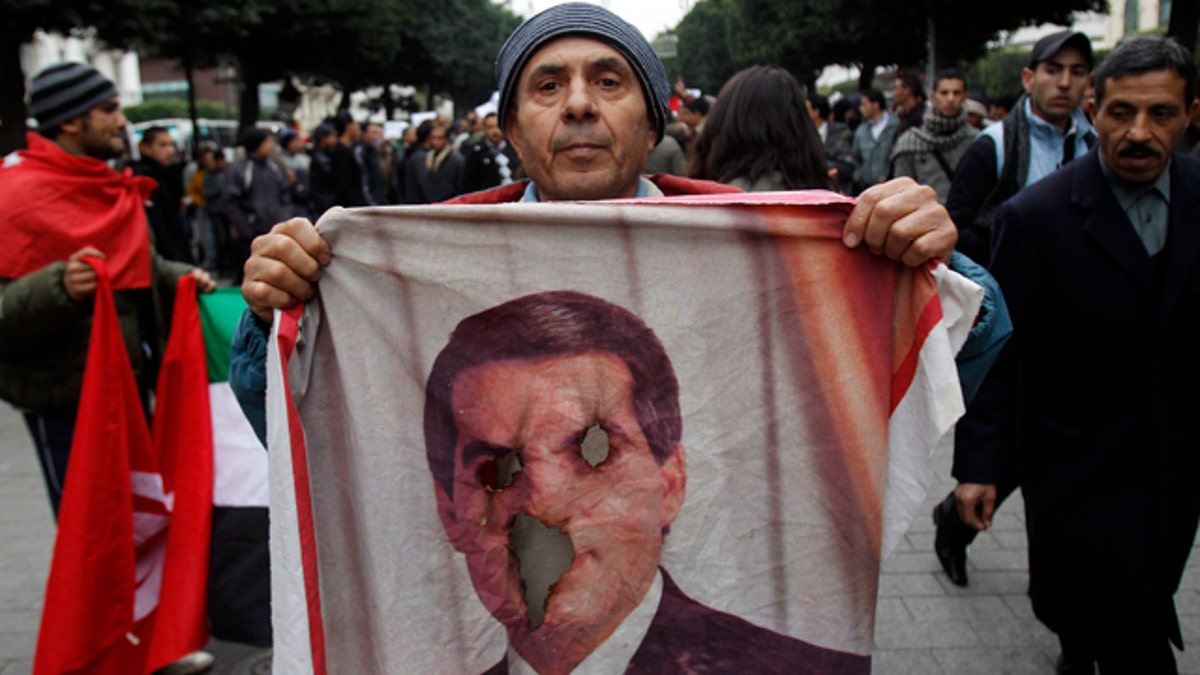
Jan. 25: A protestor holds a burned picture of former Tunisian President Zine El Abidine Ben Ali during a demonstration in Tunis. (AP)
TUNIS, Tunisia -- Tunisia has issued an international arrest warrant for ousted President Zine El Abidine Ben Ali, accusing him of taking money out of the North African nation illegally.
Ben Ali, who fled to Saudi Arabia after being driven from power this month by violent protests, is also being charged with illegally acquiring real estate and other assets abroad, Justice Minister Lazhar Karoui Chebbi said Wednesday.
Tunisia is also seeking the arrest of Ben Ali's wife, Leila, as well as other family members. French media have reported that Leila left the country with millions in gold bullion.
Ben Ali, his wife and their clan have been widely accused of abusing their power to enrich themselves: In France, where family members are believed to have assets ranging from apartments to racehorses, the Paris prosecutors' office has opened a preliminary investigation into their holdings.
The former president fled Jan. 14 after 23 years in power, pushed out by weeks of protests driven by anger over joblessness, repression and corruption. His swift departure was followed by riots, looting and unrest.
On Wednesday, the justice minister released figures that highlighted the massive scope of that unrest: Some 11,029 prisoners -- about a third of the country's prison population -- were able to escape amid the chaos, he said.
Of those, 1,532 prisoners have returned behind bars, he said. Another 74 prisoners died in fires that broke out at several prisons.
Chebbi spoke to reporters as Tunisian police fired tear gas at hundreds of protesters who have been pressuring the interim government to get rid of old guard ministers who served under Ben Ali.
The clashes broke out in front of the prime minister's office in Tunis, the capital. Acrid clouds of tear gas engulfed hundreds of people, and some demonstrators responded by throwing stones at police.
The state news agency TAP said officials are to announce changes to the interim government later Wednesday. The acting premier must replace five ministers who quit their posts, echoing protesters' concerns.
The caretaker government includes some former opposition leaders, but many top posts -- including prime minister and the ministers of defense, foreign affairs and the interior -- were retained by Ben Ali cronies.
Prime Minister Mohamed Ghannouchi, who took that post in 1999 under Ben Ali and has kept it through the upheaval, has vowed to quit politics after elections in the coming months. But he insists he needs to stay on for now to guide Tunisia through a transition to democracy.
Tunisia's so-called "Jasmine Revolution" has sparked scattered protests and civil disobedience in the Middle East and North Africa.
In Egypt on Tuesday, thousands of anti-government protesters, some hurling rocks, clashed with riot police in Cairo in a Tunisia-inspired demonstration to demand the end of President Hosni Mubarak's nearly 30 years in power.
